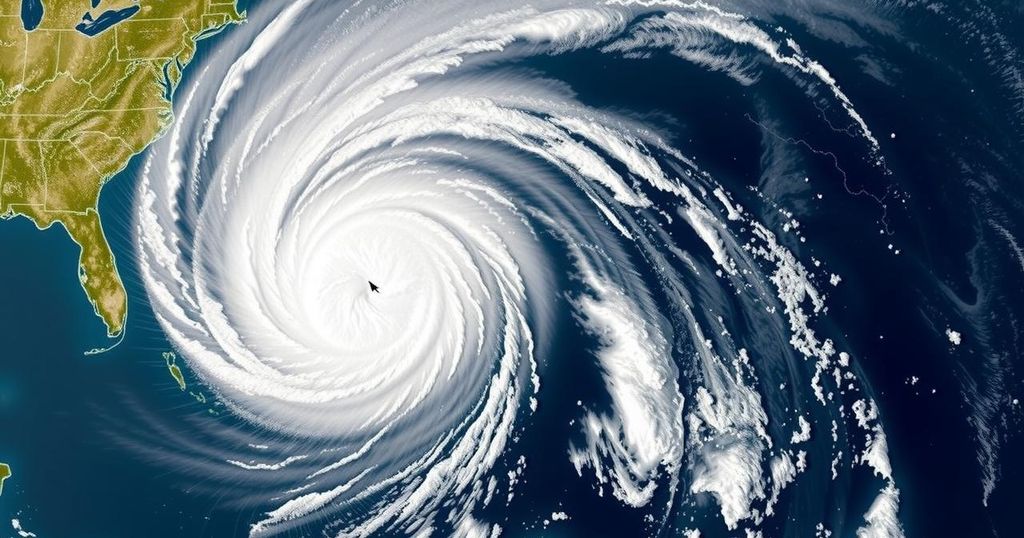Tropical Cyclone Chido Devastates Mayotte, Threatens Eastern Africa
Cyclone Chido ravaged Mayotte, unleashing winds over 220 km/h and causing widespread destruction without immediate reports of casualties. As the storm heads toward Mozambique, neighboring countries are on high alert, preparing for potential flooding and evacuations. The cyclone underscores the growing impact of climate change on the frequency and intensity of such events in the region.
Mayotte, a French territory located in the Indian Ocean, recently endured severe devastation due to Tropical Cyclone Chido, which is now advancing toward eastern Africa. The cyclone unleashed winds surpassing 220 kilometers per hour, resulting in significant infrastructural damage, including the displacement of metal roofs and the destruction of residential properties across the islands populated by over 300,000 residents. Fortunately, there have been no immediate reports of fatalities following the storm.
Francois-Xavier Bieuville, the Prefect of Mayotte, expressed in a Facebook post that the region was experiencing its most destructive cyclone since 1934, leading many residents to lose all their possessions. He stated that the highest alert level had been retracted to facilitate rescue operations once the cyclone had passed through. Nonetheless, the population remains under red alert, and officials are urging residents to remain sheltered in sturdy accommodations, while emergency responders are the only personnel permitted outside following the storm’s wrath.
French Interior Minister Bruno Retailleau highlighted the substantial impact on Mayotte, indicating that initial assessments of damage were extensive. Local reports confirm widespread power outages affecting thousands of homes, alongside the destruction of various small structures and uprooted trees. In response to the disaster, 110 rescue personnel and firefighters from mainland France and Reunion have been deployed, with an additional 140 to follow on Sunday.
In the surrounding region, the Comoros Islands also faced the fury of Cyclone Chido, prompting a red alert in specific areas to safeguard public safety. Authorities expressed concern for 11 fishermen who had gone missing at sea. In light of the cyclone, Comoros officials have directed all vessels to remain docked and have closed the primary airport and governmental offices, with schools shutting down to facilitate disaster preparedness.
Forecasts predict Cyclone Chido will continue on its eastern path, aiming for Mozambique, where it may arrive late Saturday or early Sunday. The Mozambique disaster agency has cautioned that approximately 2.5 million individuals could be affected in the northern provinces of Cabo Delgado and Nampula. Furthermore, surrounding countries such as Malawi and Zimbabwe are taking precautionary measures against anticipated flooding and potential evacuations in vulnerable areas as the cyclone intensifies.
Cyclone season in the southeastern Indian Ocean spans from December to March, a period that has witnessed increasingly violent storms in recent years. Past cyclones such as Idai in 2019 and Freddy in the previous year resulted in tragic loss of life and extensive disruption across Mozambique, Malawi, and Zimbabwe. Experts warn that the cyclones bring not only the immediate threat of floods and landslides but also the longer-term risk of waterborne diseases such as cholera, dengue fever, and malaria, which can arise in stagnant water left behind after the storms. Climate change is believed to exacerbate the severity of these cyclonic events, disproportionately impacting lower-income nations in southern Africa that contribute minimally to global climate issues.
Tropical cyclones are common occurrences in the Indian Ocean, particularly between December and March. This period is often marked by intense storms that can lead to catastrophic consequences for affected regions. Past cyclones, such as Idai and Freddy, have highlighted the vulnerability of southern Africa, where the effects of climate change may be rendering these storms increasingly powerful. Studies connect the rise in cyclone severity to global climate changes, while developing nations, with minimal contributions to climate change, continue to face significant humanitarian crises amid such disasters. Preparatory measures, such as closing schools and directing maritime vessels to remain in harbor, are critical in minimizing loss of life and property during such events.
Tropical Cyclone Chido has inflicted significant damage on Mayotte, with strong winds and destruction of homes leading to a humanitarian response. Officials from various territories are mobilizing rescue resources, while neighboring regions from Comoros to Mozambique are anticipating the storm’s impact. As climate change fuels the increasing severity of cyclones, it is imperative for affected communities to remain vigilant and prepared for both immediate and long-term recovery efforts in the face of natural disasters.
Original Source: www.voanews.com




Post Comment